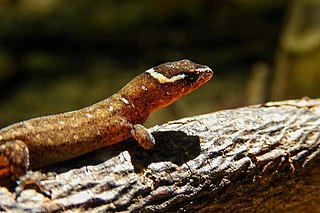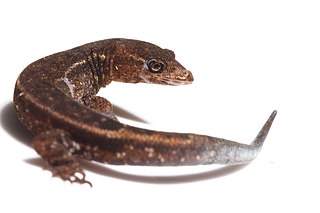
Lepidoblepharis is a genus of Central and South American dwarf geckos in the family Sphaerodactylidae, commonly known as scaly-eyed geckos.
Atelopus famelicus is a species of toad in the family Bufonidae endemic to Colombia. It is known from the Cordillera Occidental in Cauca and Valle del Cauca departments.
Rhaebo hypomelas is a species of toad in the family Bufonidae. It is endemic to Colombia and known from the Chocó region in the departments of Antioquia, Chocó, Risaralda, Valle del Cauca, and Cauca, at elevations of 10–1,600 m (33–5,249 ft) asl. There are also reports from Ecuador but these are not considered valid. Its natural habitats are lowland tropical moist forests. It is a terrestrial species living in leaf litter near water. It is a rare species that is threatened by habitat loss.
Hyloxalus chocoensis, sometimes known as the Choco rocket frog, is a species of frog in the family Dendrobatidae. It is found in western Colombia to east-central Panama. In Colombia it is known from Chocó, Valle del Cauca, and Antioquia. Anomaloglossus confusus from northwestern Ecuador were formerly confused with this species, but the identity of many other populations remains uncertain. Taxonomic uncertainty hampers knowledge about the species.
The Imbabura tree frog is a species of frog in the family Hylidae found in the Pacific lowlands of western Colombia and northwestern Ecuador from the sea level to 1,000 m (3,300 ft) asl.

Craugastor raniformis is a species of frog in the family Craugastoridae. It is found in Colombia and Panama. It is a reasonably common species found in humid lowland and montane forests up to 1,500 m (4,900 ft) asl. It is also common in wet pastureland. Furthermore, it is one of the dominant frogs in abandoned mixed farming areas in the coastal Pacific rainforests in Colombia. This adaptable species is not considered threatened.

Pristimantis curtipes is a species of frog in the family Craugastoridae. It is found in the Nariño Department of southern Colombia and in the western and eastern Andes of Ecuador south to Desierto de Palmira.

Diasporus gularis, also known as the Esmeraldas robber frog, is a species of frog in the family Eleutherodactylidae. It is found in western Colombia and northwestern and central Ecuador.
Pristimantis kelephus is a species of frog in the family Craugastoridae. It is endemic to Colombia and known from the Cordillera Occidental in Cauca, Chocó, and Valle del Cauca Departments, at elevations of 1,900–2,610 m (6,230–8,560 ft) asl. Its type locality is in El Cairo, Valle del Cauca Department. The specific name is derived from Greek kefephos, meaning leper, in reference to the rounded pustules on the dorsal surfaces that provide the impression of some disfigurement caused by leprosy.

Pristimantis permixtus is a species of frog in the family Craugastoridae. It is endemic to Colombia where it is found on the Cordillera Occidental and the Cordillera Central in Antioquia, Caldas, Quindío, Risaralda, Tolima, and Valle del Cauca departments.

The multicoloured tanager is a species of bird in the family Thraupidae. It is endemic to the mountains of Colombia, and as of 2010 has been categorized as vulnerable (VU) by the IUCN.

Micrurus mipartitus is a species of coral snake in the family Elapidae. It is found in South and Central America. The redtail coral snake is common in agricultural areas in Colombia. Its highly neurotoxic venom is known to cause seizures in its prey by activating nerve proteins responsible for seizures within it.

Lepidoblepharis duolepis is a species of gecko, a lizard in the family Sphaerodactylidae. The species is endemic to Colombia.
Lepidoblepharis microlepis is a species of gecko, a lizard in the family Sphaerodactylidae. The species is endemic to Colombia.
Lepidoblepharis peraccae is a species of gecko, a lizard in the family Sphaerodactylidae. The species is endemic to western Colombia.
Lepidoblepharis sanctaemartae is a species of gecko, a lizard in the family Sphaerodactylidae. The species is found in southern Central America and northern South America.

Lepidoblepharis xanthostigma, also known as the yellow-spotted gecko is a species of gecko, a lizard in the family Sphaerodactylidae. The species is found in Central America and north-western South America.
Echinosaura orcesi is a species of lizard in the family Gymnophthalmidae. The species is endemic to northwestern South America.
Alopoglossus lehmanni is a species of lizard in the family Alopoglossidae. The species is endemic to western Colombia.









